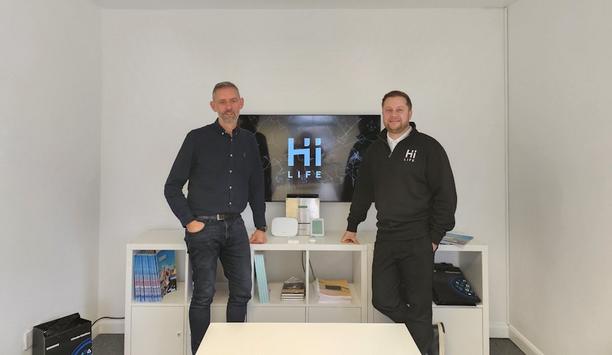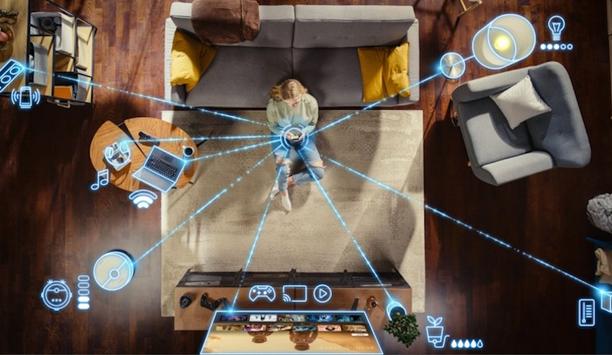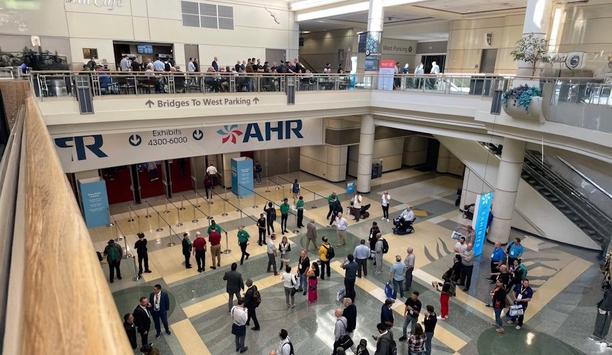Samsung HVAC - Experts & Thought Leaders
Latest Samsung HVAC news & announcements
HiiLIFE, a renowned technology provider for the construction sector, is proud to announce its appointment as the official Samsung Climate Solutions distributor in Ireland. The strategic partnership builds upon HiiLIFE’s successful collaboration with Samsung in the UK, extending their joint commitment to deliver advanced heating, ventilation and air conditioning (HVAC) solutions to both the commercial and residential markets nationwide. HiiLIFE - official Samsung distributor in Ireland Charles McAlpine, Technical Sales Director at HiiLIFE, says: “We’re delighted to extend our work with Samsung and become its official climate solutions distributor in Ireland. This expansion marks a significant milestone in HiiLIFE’s growth strategy, reinforcing our position as a major technology provider in both the UK and Ireland.” He adds, “Samsung introduced its first air conditioner in 1974. Since then, the company has continuously invested in new energy-efficient solutions for cooling, heating, domestic hot water, refrigeration, and smart building technology, setting the standard in the industry. We are excited to bring these advanced climate control products to customers, backed by our dedicated expertise and support.” HiiLIFE's after-sales support for Samsung’s HVAC products HiiLIFE will leverage its extensive industry experience and customer-focused approach to deliver comprehensive sales, design, installation and after-sales support for Samsung’s HVAC products. Andy Burt, Head of Sales and Business Development at Samsung UK and Ireland, states: “We are delighted to broaden our collaboration with the HiiLIFE team to Ireland, building on our successful distributor agreement in the UK. HiiLIFE’s expertise and strong presence in the construction sector make the firm an ideal partner to deliver our HVAC solutions to the Irish market.”
The Heating Installer Awards 2025 has arrived marking a remarkable decade celebrating hardworking installers across the UK. Entries are opening to installers on Tuesday 8th October, with lots of exciting awards to be won. Now entering its 10th anniversary, the Heating Installer Awards holds a search for the best installers in the nation. The competition builds a positive conversation in the industry and promotes excellent heating installers and their work, which can often go unrecognized. Selection of products There are prizes from a bundle worth over £10,000 on offer for the finalists Supported by The IPG, Polypipe Building Products, Powered Now, Samsung Climate Solutions, Stelrad, CIPHE, and Refresh, the awards are free to enter and allow installers to showcase their work to potential customers. There are prizes from a bundle worth over £10,000 on offer for the finalists, including a selection of products from sponsors and partners, as well as money-can’t-buy prizes. Judging panel After entries close in February 2025, a judging panel made up of industry experts, professional bodies, and trusted installers will choose the regional finalists as well as an initial shortlist for the category winners. Entries submitted will be carefully reviewed and scored by the judging panel that will mark the project against outstanding results, problem-solving skills, knowledgeable product selection, excellent customer service, and technical expertise. National Heating Installer Awards Regional winners will be announced in April 2025, before going into the running to be crowned Regional winners will be announced in April 2025, before going into the running to be crowned the national Heating Installer Awards winner 2025 in June at Birmingham NEC. During the presentation, last year’s winners Nick Irlam of Irlam UK in Lancashire, Damon Blakemore of Blakemore Plumbing & Heating and Luke Neale, apprentice at Chelmsford Plumbing and Heating will crown the next national winner, most sustainable installer, HVAC award and rising star. New developments To celebrate the award’s 10th anniversary, there will also be some new additions to the Heating Installer Awards calendar that are set to make the awards bigger than they’ve ever been. More on this is coming soon. Think they’ve got what it takes to be crowned Heating Installer of the Year 2025? Visit the website and complete the entry form. Follow them on X (Twitter), Facebook, Instagram, TikTok, and LinkedIn to stay up to date with new developments, plus be the first to find out about competitions from the awards’ sponsors and partners!
Airzone Control, the provider of intelligent and innovative HVAC control solutions, announces an integration partnership with building intelligence software provider Bodhi. This new partnership will allow the cloud-based Bodhi building operating platform to monitor and control Inverter (VRF/mini-split) HVAC units, simplifying property operations management and supporting superior guest and tenant experiences. Building operating platform Bodhi bridges the gap between property management and technology systems for hospitality venues, MDUs, and commercial buildings. This platform integrates with property management software, sensors, and technology subsystems including lighting, shading, AV, and HVAC. Via Bodhi, property managers can schedule automation, access usage analytics, and reporting platforms, view alerts, manage trouble tickets, and more. Bodhi also powers a web-based guest app that can be used to do everything from unlocking doors and adjusting the temperature to requesting housekeeping and ordering room service. bi-directional communication The Airzone/Bodhi integration leverages the flagship Airzone Aidoo Pro control solution to connect the Inverter Airzone enables bi-directional communication between HVAC systems and IoT ecosystems like Bodhi using an exclusive library of manufacturer protocols from Daikin, Mitsubishi, Samsung, and more. The Airzone/Bodhi integration leverages the flagship Airzone Aidoo Pro control solution to connect Inverter (VRF/mini-split) units to the Bodhi platform. Aidoo Pro Aidoo Pro is an affordable, easy-to-install system add-on: An Aidoo Pro is directly connected to each Inverter unit and integrates with Bodhi via a local API. In the future, Bodhi will also offer hardwired Modbus integration between Aidoo Pro and the Bodhi thermostat. Superior Insights and Control The Airzone Aidoo Pro delivers in-depth error code reporting, supplying the Bodhi platform with detailed information for fast error detection and resolution. “The 1:1 Aidoo Pro system design, where each HVAC unit has its control device, helps us deliver simplified property operations management with minimal downtime,” says Rock Scofield, co-founder of Bodhi. “Management has instant, granular insight into which spaces and guests are affected by any HVAC system issues. The distributed system design also ensures that device outages have the minimum possible impact.” Improved Efficiency and Lower Costs Bodhi can automatically begin adjusting a room’s temperature to a comfortable setting upon check-in The Airzone/Bodhi integration uses Bodhi’s sophisticated guest presence detection (GPD) logic to automate the HVAC system setpoint and maximize building efficiency. Properties can reduce their carbon footprint and energy costs while enhancing occupant comfort by establishing different temperature set points for occupied and unoccupied spaces. Using a variety of sensors and service integrations, Bodhi can automatically begin adjusting a room’s temperature to a comfortable setting upon check-in, before guests arrive at their room, or, put the HVAC system in “eco” mode when a guest is away. HVAC efficiency “This partnership with Bodhi will lead to dramatically improved HVAC efficiency for hospitality, MDU, and commercial properties across North America,” says Antonio Mediato, CEO of Airzone. “Operators will no longer have to choose between deploying the most efficient HVAC units and the most sophisticated property operations management. With Airzone and Bodhi, they can have both.”
Insights & Opinions from thought leaders at Samsung HVAC
In today's smart homes, traditional climate control meets modern automation and connectivity. Technologies such as smart thermostats, home automation platforms, sensors, zoned heating and cooling, and artificial intelligence are combining to yield new levels of comfort for homeowners who embrace the smart home concept. We asked our Expert Panel Roundtable: How is the changing smart homes market impacting HVAC systems?
The HVAC Industry gathered in Orlando for AHR Expo 2025, focusing on the latest advancements in technology. Attendees included contractors, manufacturers, engineers, system design professionals, facility managers, architects, wholesalers, and distributors. This year’s expo highlighted game-changing innovations, regulatory shifts, and emerging trends designed to enhance efficiency, sustainability, and connectivity. For HVAC professionals, these developments translate into practical solutions that improve system performance, optimize energy use, and simplify compliance with evolving industry standards. The Next Phase of Refrigerant Transition The transition to A2L refrigerants is a dominant theme at this year’s expo, with major players such as Arkema, Chemours, LG Electronics, Rheem, Daikin, and others showcasing the latest refrigerants and equipment solutions. Following the deadline of Jan. 1, 2025, the shift from R-410A to R-32 and R-454B is well underway, with 80% of manufacturers opting for R-454B. While concerns about flammability persist, experts emphasize that proper training and system design can mitigate risks. LG Electronics' full product line Some OEMs opted for R-454B as an option that is closer to a “drop-in” solution Some OEMs opted for R-454B as an option that is closer to a “drop-in” solution. Daikin was among the manufacturers to go all-in on R-32, which required a complete redesign of product components, ultimately pioneering to more efficient, cost-effective systems, according to the company. LG Electronics' full product line now uses R-32 refrigerant, and they started shipping products in December. All R-410A equipment will be gone by the end of Q1. variety of products on R-454B refrigerant Rheem announced their 100-year anniversary, and a new tagline, "Engineered for Life." They say the trend is toward side-discharge heat pumps, although the industry needs a mix of both. They had a variety of products on display that use R-454B refrigerant. Attendees at AHR Expo 2025 came away with an understanding that refrigerant regulations and selecting compatible equipment will be crucial for ensuring smooth transitions in commercial and residential applications. Intelligent Building Automation and Controls Smart HVAC technology is revolutionizing building control, with AI-driven automation Smart HVAC technology is revolutionizing building management, with AI-driven automation, IoT connectivity, and remote monitoring taking center stage. Companies like Distech Controls and Schneider Electric are introducing IP-based controllers that integrate seamlessly with existing building management systems. Belimo’s intelligent butterfly valve and Delta’s Node-RED Programming with built-in Python support, among other products, are making automation more powerful and user-friendly. Copeland’s Sensi Touch 2 smart thermostat Copeland’s Sensi Touch 2 smart thermostat and Sensi equipment interface module (EIM) can eliminate the need to pull additional wires during installation. The system is weatherproof, indoor, or outdoor, and communicates using radio frequency (RF). AHR Expo 2025 made a strong case that investing in smart controls will improve operational efficiency, reduce downtime, and enable predictive maintenance. Hydronic Systems for Data Center Cooling One major player is Bell & Gossett/Xylem, whose hydronic cooling systems target data center market The rise of data center cooling solutions was another recurring theme at AHR. One prominent player is Bell & Gossett/Xylem, whose hydronic cooling systems target the data center market. The company’s e-1531X and e-1532X smart pumps offer enhanced energy efficiency and a larger "efficiency island." These systems are designed to meet the growing demand for sustainable data center cooling, providing a net-zero roadmap. As data center energy consumption rises, hydronic solutions offer a scalable, efficient approach to thermal management. Heat Pumps Expand Capabilities and Market Reach Heat pumps continue to dominate as a top energy-efficient alternative for commercial and residential applications. Companies such as Danfoss, Mitsubishi, and Samsung are pushing the boundaries with heat pumps that operate in extreme temperatures. Danfoss is progressing forward related to four application areas at AHR 2025--heat pumps, data centers, RTU/DOAS, and retail/refrigeration. Emphasis is on lower emissions and better energy efficiency. Midea drew a lot of attention at AHR 2025, including modular air handler Midea drew a lot of attention at AHR 2025, including their modular air handler – the EVOX G³ – that breaks down into three pieces for easy movement and installation in any of six configurations. They are also opening showrooms throughout the country so consumers and contractors can see and touch the products. Integration with renewable energy sources Johnson Controls-Hitachi mini-splits have a self-cleaning feature called FrostWash Johnson Controls-Hitachi Air Conditioning’s Hitachi mini-splits have a self-cleaning feature called "FrostWash;" they intentionally build a frost layer on the coil so the fine particulates can be captured and then melted away, thus avoiding mold and other contaminants. It can be used in lieu of UV light, which damages plastics. The heat pump market is growing rapidly, and advancements in low-temperature performance and integration with renewable energy sources will drive adoption. The Drive Toward Sustainability Sustainability is a recurring theme at the expo, with manufacturers prioritizing energy-efficient equipment, smart automation, and low-GWP refrigerants. Companies like Lennox, and Rheem are launching highly efficient packaged rooftop units and unitary heat pump systems. Grundfos’s distributed pumping technology and Ziehl-Abegg’s ZAcore intelligent control platform further demonstrate the industry's push toward lower energy consumption and minimal environmental impact. Investing in sustainable HVAC technologies Availability is paramount, and they are opening a new factory in Mexico Lennox is serving the "emergency replacement" market for HVAC equipment with their Xion line. Availability is paramount, and they are opening a new factory in Mexico. Telling the "story" of humidification at AHR 2025, Condair has products for any vertical. They say more education and awareness are needed on the value of humidification. As regulations tighten and demand for green building solutions rises, investing in sustainable HVAC technologies will be critical for long-term success. Smarter, Cleaner, and More Efficient AHR Expo 2025 underscores the industry's shift toward smarter, cleaner, and more efficient HVAC solutions. Whether it’s refrigerant transitions, intelligent automation, or advanced heat pump technology, staying ahead of these trends will help HVAC professionals deliver superior performance while meeting regulatory requirements. The innovations showcased in Orlando set the stage for a future where HVAC systems are not only more efficient and environmentally friendly but also easier to manage and integrate into modern buildings.
A new cloud-based solution enables HVAC professionals to access VRF systems remotely to diagnose service issues and lessen the time and costs of providing service. CoolAutomation’s Remote HVAC Service Solution enables HVAC service providers to remotely troubleshoot issues by analyzing real-time and historic data trends and analysis. They receive automatic error and anomaly notifications in their office or on their mobile phones. “The remote service solution provides the tools that HVAC service providers need to offer remote services to their existing clients while attracting new customers who understand the value of remote service for their business,” says Roy Muchtar, VP of Products at CoolAutomation. variable refrigerant flow On site, a CoolAutomation CloudBox connects directly to the VRF and links to the cloud via routers and the Internet. The box shares data on the operation of the VRF to the cloud, where a subscription service enables it to be analyzed to determine any problems. The service solution can connect to any major VRF (variable refrigerant flow) system, including Mitsubishi, Daikin, LG, Samsung, et. al.; and can connect to VRF units from multiple manufacturers in case a customer has installed more than one. The cloud solution begins monitoring information from the VRF at the time of installation If a service provider is migrating from one brand to another, the cloud solution can operate with both if there is a period of overlapping systems. The experience is the same regardless of the VRF brand. The cloud solution begins monitoring information from the VRF at the time of installation, providing a benchmark of how the equipment operates when it is first commissioned. Over time, the technology collects and stores additional data on how it continues to function. remote service solution The service provider receives an email or an alert on their smart phone if something is wrong or if a component is operating outside a defined parameter. The remote service solution also shortens the cycle of service and support. In case service is needed, the provider can diagnose the problem remotely before he or she visits the site; in some cases, remote service can solve the problem. If any anomaly surfaces, the service provider has access to the entire history of system operation to show them what has changed and when. If a site visit is needed, the technician can arrive on site knowing what the problem is and with a plan (and required materials) to solve it quickly. There is no need, for example, for one site visit to diagnose a problem and then a second visit to fix it. cloud-based approach Knowing ahead the complexity of a problem helps service providers decide which technicians (e.g., what level of expertise) to send to the site. The cloud-based approach can also maximize productivity of a service company’s most experienced technicians. A knowledgeable technician can address multiple customer issues in less time, diagnose the problems remotely, and then dispatch less experienced technicians as necessary, knowing exactly what they need to do. The model of sending a technician on site to address every service call, from small to big, will be challenging" In short, the remote service solution is another tool in a provider’s toolbox, helping them improve service, lower costs, and benefit their own bottom lines. There are also benefits for any companies seeking to provide “HVAC as a service” – less cost and more dollars go to the bottom line from any monthly subscription payments. remote service capabilities During the COVID-19 pandemic, the benefits of remote service have become even more obvious as a way to minimize customer visits. In fact, in general, end customers increasingly are coming to expect remote service capabilities from providers. “HVAC technical service organizations and HVAC contractors will have to make some transition in the way technical service is being provided because of the pandemic,” says Muchtar. “The model of sending a technician on site to address every service call, from small to big, will be challenging in an environment of ever-changing travel restrictions.” The remote service solution also avoids having to set up an appointment to access a system if the building is vacant (because of coronavirus). Also, any anomalies in system operation are less likely to be noticed if the building is empty, so remote monitoring is even more valuable. From the end customer’s perspective, it is likely a service provider can solve any situation before the customer is even aware there is a problem. The time needed for problem resolution is shorter, and lifespan of the system is longer because small problems are addressed before they cause larger problems. In addition to service issues, the information stored in the cloud provides voluminous data that can be analyzed to yield insights on how the system has been used, the performance of various elements, etc. interpreting larger trends The CloudBox, also used for home automation, is already in use in more than 90 countries A rules engine can aid with analyzing multiple factors to interpret larger trends. Rules can be customized to provide alerts based on specific parameters and/or anomalies, and customers can share a library of rules generated by other users. Alerts may include operational analytics (e.g., if the room temperature goes below 60 for 30 minutes), manufacturer alerts (if something is wrong with the VRF), and maintenance alerts (e.g., filter needs to be changed). The new technology, launched in late June, has been beta testing worldwide for several months, including in the United States, the United Kingdom, Israel and Germany. The CloudBox, also used for home automation, is already in use in more than 90 countries. targeting facility managers Use of the technology will soon be expanded beyond VRFs to connect with chillers and other more traditional HVAC systems; however, additional integration is needed to operate with various brands of chillers, each with a different interface. In addition to the remote service solution, CoolAutomation also offers a control application (for end users). Later this year, the company will be introducing an application targeting facility managers that addresses issues such as scheduling and energy consumption
Leveraging Radiant And Hydronics To Help Achieve Decarbonization Goals
DownloadSealed Connectors In Harsh Environments
DownloadPowering And Cooling Next Generation Data Centers
DownloadDebunking Myths To Promote A Bright Future For Heat Pumps
DownloadOptimizing Comfort: The Ultimate HVAC Component Guide
Download
















